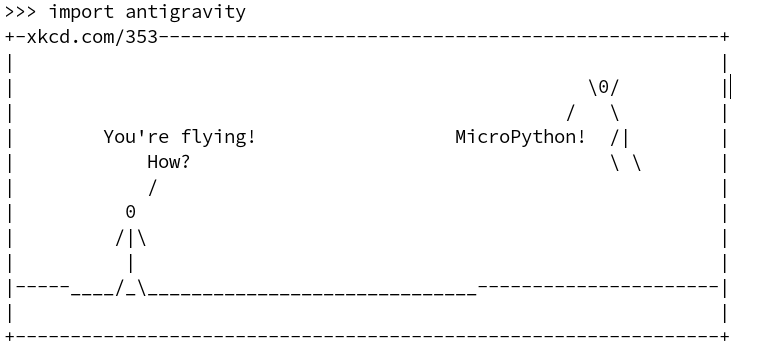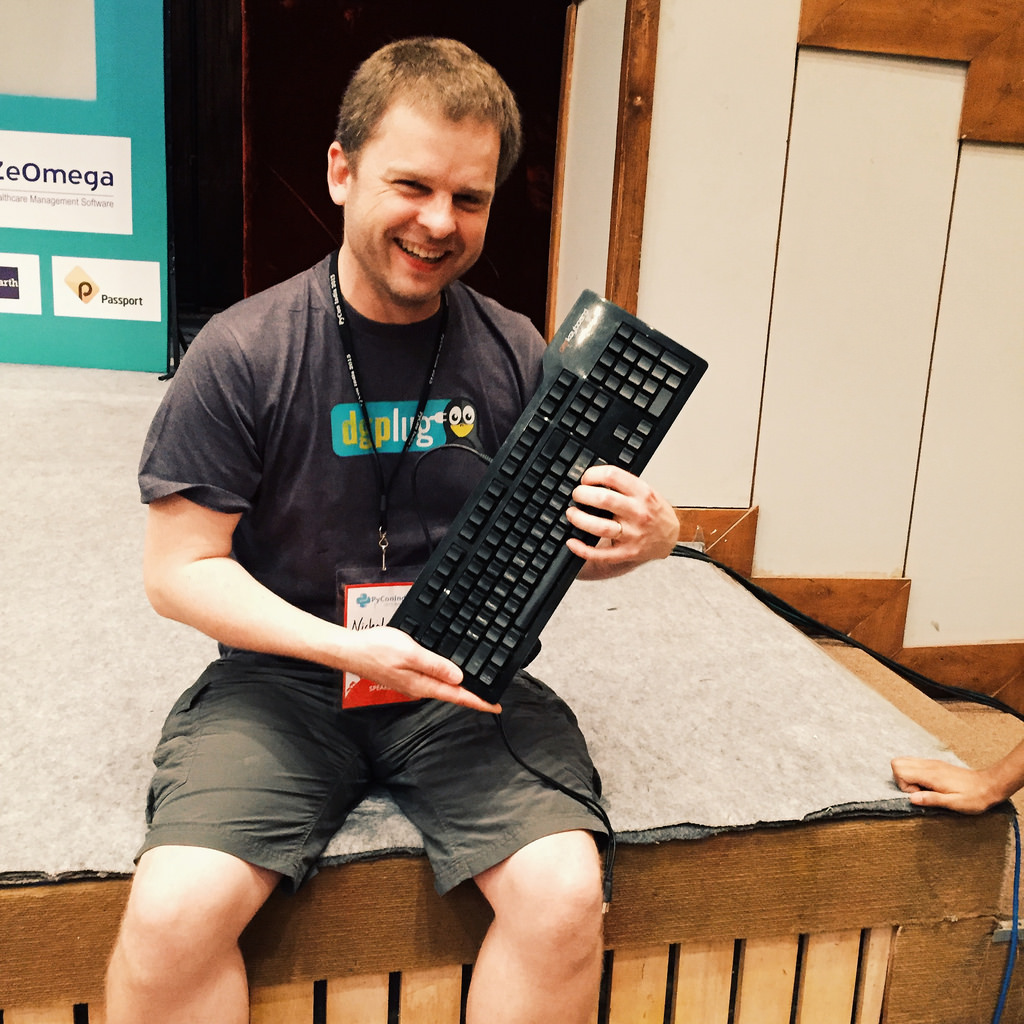"The future of the world is in my classroom today"- Ivan W. Fitzwater. To shape the world we need to give the children the correct environment to learn new things. BBC
micro:bit is such a project. It has been a year since micro:bit was launched in UK. This tiny device was launched with an aim to train young minds to think, create and of course code.
What is this fun-size piece?
micro:bit is an ARM powered embedded board. This cookie sized computer (4 × 5 cm) has two input buttons, 5*5 led lights, two microcontroller processors, with one allowing the device to work as a USB on a personal computer irrespective of the operating system . The bigger chip in the upper left of the device is the ARM Cortex- M0 processor with a 416 KiB of memory. For performing Physics experiments it has a digital compass, accelerometer. USB or external battery backup can be used for powering micro:bit. Other features like Bluetooth connectivity makes the device so cool.
From Python to MicroPython
MicroPython is Python for microcontrollers, other small sized and confined hardware. It is an implementation of Python 3, where it behaves like Python but does not use the CPython source code. It is written from the scratch. MicroPython comes with a useful subset of the Python standard library, and is published under the permissive MIT license.

Damien George : the man behind MicroPython
In 2013 Damien George started his project of shrinking the language Python. As it could run on small devices. He started MicroPython as a Kickstarter project. It took him almost 6 months of time to realize that it is a workable idea. Only after he had written Python compiler as thin as it could be compressed into a RAM of 128 kilobytes. This "Genuinely Nice Chap" was awarded the PSF's Community
Service Award in March 2016.
The Era of Digital creativity:
“I never teach my pupils, I only attempt to provide the conditions in which they can learn.” Albert Einstein. For a long time, the BBC has been
endeavoring to provide fyouth with good conditions to help
them learn, especially around technology. They started this mission with the launch of the BBC Micro, as series of microcomputers in the 1980's. The latest effort in that mission was the micro:bit project. The BBC started with the massive aspiration of giving these pocket size fun machines, micro:bit, to a million 11 and 12 year old children in the UK. An amazing aim indeed, motivating a generation to think,to visualize and to code. Children will be able to make their fantasies come true on this blank slate.
PSF joining the mission:
BBC found that Python is the good choice for micro:bit. Python is well known as a relatively easy language to learn, and is especially popular for
teaching children. The PSF is one of the key partners in this project, as the micro:bit is not only a fascinating education use case, but also illustrates Python's utility in an area not normally associated with
the language, embedded systems programming.
Whenever we think of an embedded device the ideas like 'low level programming', 'coding in the language C ' just pop in our minds. But that makes things difficult, needs expertise and is of course not very suitable for 11 or 12 year olds. Here MicroPython came to help. With MicroPython people can interact with the hardware in a lucid manner.

Nicholas Tollervey, our very own ntoll is the guy who was acting as the bridge between PSF and the project. It is majorly for his efforts, now MicroPython is running on micro:bit (followed by his much jumping and shouting of 'woo hoo'). The following is what the father of MU code editor, wants to say about his journey with micorbit.
What made you interested in the project?
I was relatively well known in UK Python circles as being interested in
education (I created and organize the PyCon UK education track for
teachers and kids). A friend heard about the BBC's request for partners
in a programming-in-education project called "Make it Digital" and
suggested I take a look. The BBC's request for partners actually
mentioned Python! That was at the end of 2014.
When did you get involved with it?
I took the BBC's request for partners and, with
the permission of the PSF board, put together a proposal for the PSF to
become a partner.
At this stage, all I knew was the project included programming and a
mention of Python. Given this mention and Python's popularity as a
teaching language I felt it important that the Python community had the
opportunity to step up and get involved.
In January 2015 the BBC invited the PSF to join a partnership relating
to the mysterious "Make it Digital" project. We had to sign NDA
agreements and it was only then that I learned of the plans for the BBC
micro:bit device.
How does this project helped/changed education system in UK?
Every 11-12 year old in the UK should have one in their possession by
now. A huge number of resources have been made available, for free, for
teachers and learners to learn about programming. Lots of the partner
organisations have become involved in delivery of educational resources.
From a Python specific perspective, between 80-100 of the UK's Python
developers have been involved in either writing code for kids, creating
tools for kids to use, turning up at teach-meets to work with teachers
and building cool educational projects for people to use in the classroom.
It's too early to tell what the impact has been. However, in ten years
time I'll know it's been a success if I interview a new graduate
programmer and they say they got started with the micro:bit. :-)
How did PSF got involved with this project?
The partnership was between organisations. A rag-tag band of volunteers
from the UK's Python community was not an option - ergo, my acting as a
PSF Fellow on behalf of the PSF.
This was actually quite useful since a large number of the volunteers
got involved because they would be acting under the auspices of the PSF.
It's an obvious way to motivate people into giving something back to the
community - run it as a PSF project.
What was PSF's role/ how did PSF helped the project?
The original role of the PSF was to create educational resources, offer
Python expertise and provide access to events such as PyCon UK through
which teachers could be reached. The BBC explained that another partner
was actually building the Python software for the device.
The complete story is told in this blog post:
What are the changes that the project had brought?
Well, I believe it has brought the MicroPython project to the attention
of many people in the education world and wider Python community. I also
believe it has brought educational efforts to the attention of programmers.
Education is important. It's how we decide what our community is to
become through our interaction with our future colleagues, friends and
supporters.
micro:bit in PyCon UK 2016
This year's Pycon UK took place, from 15th to 19th September, 2016, in Cardiff. PSF as a part of its prime mission "to promote the programming language Python" sponsored Python conferences around the globe. "They are very generous sponsors", was what ntoll had to say about the
role of the PSF in PyCon UK.
To teach the students one has to educate the teachers. A lot of preparatory work had been done before actually distributing the micro:bits including the changes made in the CS curriculum of the students. About his plan in Pycon UK Ntoll ran several workshops for teachers and another for kids as part of
the education track. They had distributed these fun machines (almost 400) to the attendees.
Presently there is a lot of micro-fun and micro-love going on in PyCon UK
Present status of micro:bit
One of the major and primary reason for PSF joining the mission was that the project is open source. Both the software and hardware designs have released under open licenses. Now as the designs are open and available for the mass, anyone and everyone can remake these fun pieces. Microbit Foundation has been created and PSF is a part of it
Renaissance in making : join the movement
micro:bit has thousands possibilities hidden in it. People are exploring them, drawing their dreams with micro:bit. The following are some cool projects done with microbit:
A keyboard constructed just by affixing a simple buzzer to the micro:bit.
Our childhood [game of snakes] (https://twitter.com/HolyheadCompSci/status/750242493996957696) recreated with the help of micro:bit, MicroPython.
An effective clap controlled robot built with the help of micro:bit, MicroPython .
"Knowledge is power". Nowadays, heroes don't come with a sword, but with a micro:bit in their hands. So, if you want to learn, have fun and be a part of the mission grab your own micro:bit and start coding.
